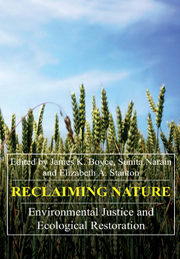Book contents
- Frontmatter
- Contents
- List of Figures and Tables
- Acknowledgements
- Introduction
- Part I ADDING VALUE
- 1 The Blessing of the Commons: Small-Scale Fisheries, Community Property Rights, and Coastal Natural Assets
- 2 Natural Resource Management and Poverty Alleviation in Mountain Areas
- 3 Harvesting the Rain: Fighting Ecological Poverty through Participatory Democracy
- 4 Net Benefits: The Ecological Restoration of Inland Fisheries in Bangladesh
- Part II DEMOCRATIZING ACCESS
- Part III CAPTURING BENEFITS
- Part IV DEFENDING THE COMMONS
- About the Contributors
- Index
4 - Net Benefits: The Ecological Restoration of Inland Fisheries in Bangladesh
from Part I - ADDING VALUE
Published online by Cambridge University Press: 05 March 2012
- Frontmatter
- Contents
- List of Figures and Tables
- Acknowledgements
- Introduction
- Part I ADDING VALUE
- 1 The Blessing of the Commons: Small-Scale Fisheries, Community Property Rights, and Coastal Natural Assets
- 2 Natural Resource Management and Poverty Alleviation in Mountain Areas
- 3 Harvesting the Rain: Fighting Ecological Poverty through Participatory Democracy
- 4 Net Benefits: The Ecological Restoration of Inland Fisheries in Bangladesh
- Part II DEMOCRATIZING ACCESS
- Part III CAPTURING BENEFITS
- Part IV DEFENDING THE COMMONS
- About the Contributors
- Index
Summary
The Centre for Natural Resources Studies (CNRS), since 1992, has implemented community-based environmental restoration projects in Bangladesh that seek to protect and renew floodplain ecosystems. These efforts grew out of a situation where the country's aquatic resources were under assault by massive flood control projects. The CNRS strategy was inspired by research showing that the rural poor in Bangladesh rely on a rich diversity of fish species for their diets and livelihoods. Most of these fish species depend on the annual inundation of flood waters for their reproduction and growth. Yet these crucial social and biological realities were either unseen or ignored by the leading development agencies concerned with water management, flood control and fisheries in Bangladesh. The CNRS projects have shown that an alternative strategy, based on investment in ecological restoration, can benefit both the fish and people.
Inland Fisheries in Bangladesh
In his classic book, Fish, Water and People: Reflections on Inland Openwater Fisheries Resources of Bangladesh, the late Dr. M. Youssouf Ali described the link between fisheries and rural livelihoods in the Bengal delta:
Bangladesh has the reputation of being very rich in inland openwater capture fisheries production. A large number of fish and prawns could be captured by men, women, and children at their doorsteps during the monsoon season, when all the low-lying areas of the country remained under floodwater. As a result of the plentiful availability of inland-water fish production, fish constituted the second most important component of the Bengali's diet next to rice. Bengali people have been known to be made up of ‘rice and fish’ (Ali 1997).
- Type
- Chapter
- Information
- Reclaiming NatureEnvironmental Justice and Ecological Restoration, pp. 111 - 124Publisher: Anthem PressPrint publication year: 2007
- 1
- Cited by



